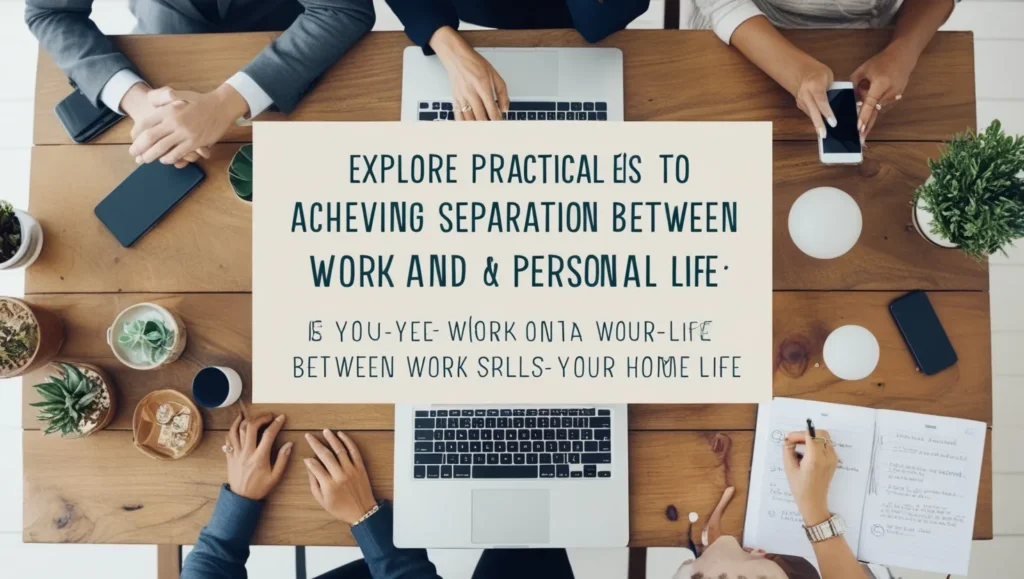How to Separate Work and Personal Life
In today’s fast-paced and hyperconnected world, the boundaries between work and personal life are often blurred. Whether you work from home, in an office, or are part of the gig economy, maintaining a balance is crucial for mental and physical well-being. Without clear separation, you may feel constantly drained, stressed, or as though you’re falling short in both areas. How to Separate Work and Personal Life This blog provides actionable steps to help you establish and maintain a healthy work-life balance.
1. Understand the Importance of Balance
Balancing work and personal life isn’t just about dividing hours—it’s about ensuring each aspect of your life gets the attention it deserves. A lack of balance can lead to burnout, strained relationships, and reduced productivity. How to Separate Work and Personal Life On the other hand, a well-balanced life fosters happiness, creativity, and better overall health.
2. Set Clear Work Hours
One of the best ways to separate work from personal life is to establish a clear schedule.
- Stick to Your Hours: Whether you work 9-to-5 or have flexible hours, create a routine and stick to it.
- Communicate Boundaries: Let colleagues or clients know your work hours, so they respect your off-time.
- Avoid Overcommitment: Learn to say no when tasks exceed your set hours, preventing unnecessary stress.
3. Create a Dedicated Workspace
If you work from home, having a designated workspace can help you mentally separate work from leisure.
- Use a Specific Area: Even a small corner with a desk can act as your “office.”
- Keep It Organized: A tidy workspace minimizes distractions and creates a clear distinction from the rest of your home.
- Leave Work in the Workspace: At the end of the day, physically leave your work area to signal the end of work.
4. Prioritize and Delegate Tasks
You don’t have to do everything yourself.
- Focus on High-Impact Tasks: Use tools like to-do lists or project management apps to prioritize your tasks.
- Delegate When Possible: Share responsibilities with colleagues or family members to reduce the load.
- Practice Time Management: Use techniques like the Pomodoro method or time-blocking to stay efficient.
5. Establish Personal Time Rituals
Personal time is essential to recharge. Build rituals that allow you to unwind.
- Exercise Regularly: Physical activity reduces stress and boosts energy.
- Schedule Hobbies: Dedicate time to activities that bring you joy, such as reading, gardening, or painting.
- Spend Quality Time with Loved Ones: Make family dinners, game nights, or outings a regular part of your week.
6. Limit Digital Intrusions
The constant ping of emails and notifications can make it hard to disconnect.
- Turn Off Notifications After Hours: Silence work-related apps to create a digital boundary.
- Set App Limits: Use phone settings to restrict access to certain apps during personal hours.
- Unplug Regularly: Designate screen-free time to fully engage with your surroundings.
7. Learn to Mentally Disconnect
Sometimes, even when the workday ends, your mind may still linger on tasks or issues. How to Separate Work and Personal Life
- Practice Mindfulness or Meditation: These techniques can help you stay present in the moment.
- Reflect and Reset: Spend a few minutes journaling about your day to release work-related thoughts.
- Transition Activities: Engage in a short ritual, like a walk or listening to music, to shift your focus from work to personal life.
8. Seek Support
Achieving balance isn’t always easy, but you don’t have to do it alone.
- Communicate with Your Employer: If workload or expectations are overwhelming, discuss flexible options.
- Involve Your Family: Let them know your boundaries and enlist their support in maintaining them.
- Connect with a Mentor or Counselor: Professional advice can provide strategies to better navigate challenges.
9. Celebrate Wins on Both Sides
Recognize and celebrate achievements in both your work and personal life.
- Acknowledge Small Victories: Celebrate milestones, whether they’re work-related or personal.
- Reward Yourself: Treat yourself when you successfully maintain balance, such as taking a short trip or indulging in a favorite activity.
10. Reevaluate Regularly
Life is dynamic, and so are your priorities. Periodically assess how well your current balance is working and make adjustments as needed. How to Separate Work and Personal Life
Final Thoughts
Finding balance between work and personal life is an ongoing journey. By setting boundaries, prioritizing self-care, and staying flexible, you can create a fulfilling life where both work and personal time thrive. How to Separate Work and Personal Life Remember, balance doesn’t mean perfection; it means making conscious choices that align with your values and well-being.
Start small, stay consistent, and watch how balance transforms your life!

